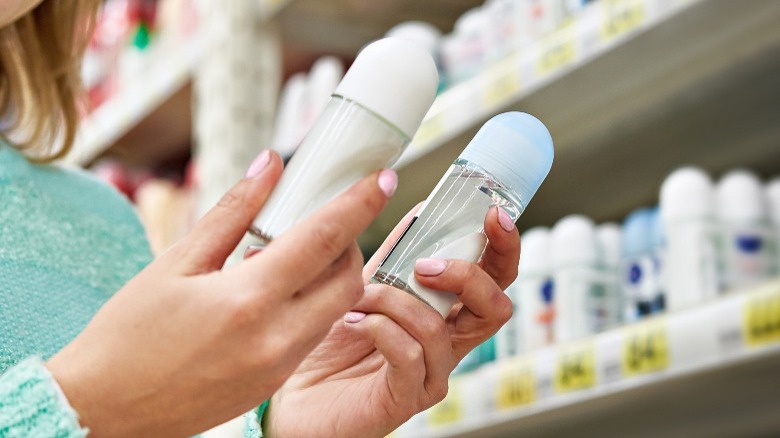4 Points To Consider Before Switching To Natural Deodorant
Natural deodorants are ripe with rumors. Perhaps you have heard that natural deodorant is all but guaranteed to give you a rash and that it does not block out odor and sweat as well as other deodorants. While some experts have claimed that both your standard drugstore deodorant and natural deodorants are just as safe for you, you are, of course, who gets to decide what you do and do not want on your body. Should you be curious about making the switch, but fearful of its potential effects, what if we told you that you might have less to worry about than you had previously thought?
Natural deodorant can work for you, should you feel committed to it, and there are reasons to make the switch. But before we get into it, it's important to break down which products we're talking about. Deodorants are products that assist in mitigating odor caused by bacteria on the skin — odor is not from the sweat itself. Antiperspirants are products that assist in controlling sweat, which performs a number of essential bodily functions, such as regulating body temperature, crucial to avoiding health issues in hot conditions. And some products are both deodorants and antiperspirants. Given the breadth of misinformation regarding so many underarm products online, here, we've broken down points to consider before you make the switch to natural deodorant.
Dispelling deodorant rumors
One of the first and most central misconceptions regarding deodorants is that they tend to contain aluminum, which is a critical agent in blocking the pores that release sweat from your underarms. Note that your average drugstore deodorants will not contain aluminum, and neither will natural deodorants. Instead, antiperspirants are the products that contain aluminum. Some rumors have stated that aluminum can accumulate in our bodies and contribute to worrisome health issues such as breast cancer, kidney disease, and even Alzheimer's Disease — none of which have been proven factual. But while aluminum can be absorbed through skin via antiperspirant, essentially none of it will actually be metabolized, according to a 2017 study on the health effects of aluminum. And one 2020 German study points to the idea that we ingest aluminum, one of the most abundant minerals on Earth, practically daily through our food or other cookware anyway.
Second, know that there are still ingredients in deodorants and antiperspirants to be wary of. While some health and wellness blogs may point to the fact that deodorants and antiperspirants could contain harmful chemicals such as parabens, according to research from the National Cancer Institute, these products are generally free of parabens in the U.S. However, a plethora of additional chemicals in deodorants and antiperspirants are labeled as chemicals of concern by the Consumer Product Health Database, where users can search, by product, for its complete ingredients.
Weighing the pros and pitfalls of natural deodorant
Thus, the benefits of natural deodorants and antiperspirants might have less to do with aluminum content or parabens, but instead, with limiting one's exposure to other lesser-known chemicals that could be of detriment. Remember, however, that there is no such thing as a "deodorant detox." Your skin does not purge any chemicals from your body through sweat.
Third, the natural alternatives to the average deodorant, while containing potentially less harmful ingredients, could also seriously bother your skin, and that's not ideal, either. Baking soda, for example, is a common ingredient used in natural deodorants meant to neutralize smells. But rashes can frequently occur due to the differences in pH between the skin and baking soda, Dr. Neelam Vashi tells SELF. Essential oils can also cause skin reactions.
And fourth, just because a deodorant is not labeled "natural" does not mean such natural ingredients cannot be found in those products, too; in fact, there are no regulatory requirements a brand must meet to label its products as "natural." It all comes down to researching individual ingredients themselves. And while natural deodorants could contain certain skin-loving ingredients that you just will not get from a traditional deodorant, be wary of potential marketing ploys. Because the skin under your arms is quite sensitive, take care when trying out new products, and consult a doctor should you have any serious sweat or skin concerns.


